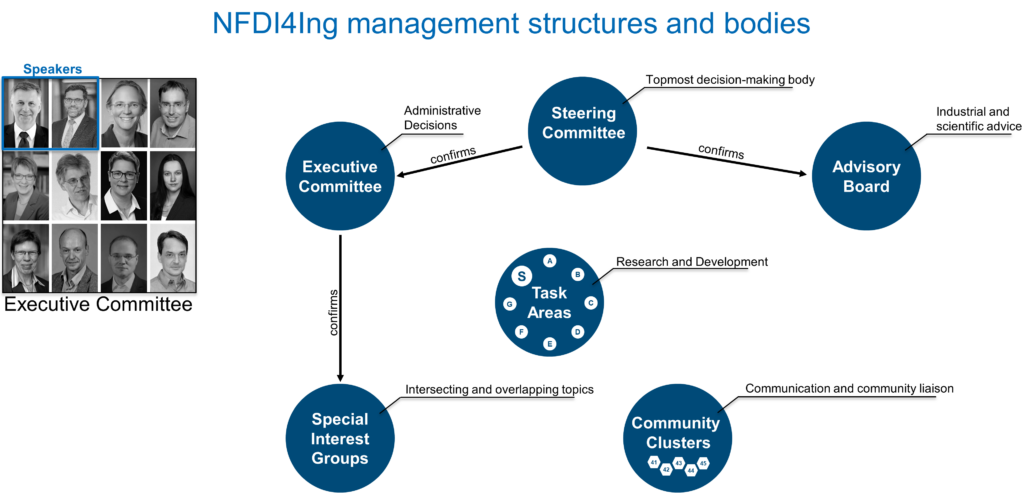basic structure & governing bodies
The consortium NFDI4Ing is structured into several internal bodies. NFDI4Ing’s responsibilities, reporting, and decision-making are established as follows: The consortium is represented by its speakers, Robert H. Schmitt (RWTH Aachen) and Peter Pelz (TU Darmstadt). The main governing bodies are the steering committee and the executive committee. The speakers are tasked with participating in meetings of the National Research Data Infrastructure (NFDI e.V.) and the Deutsche Forschungsgemeinschaft (DFG), and responsible for informing the governing bodies of NFDI4Ing on relevant topics and decisions. They are supported by the task area management, which is likewise located at the aforementioned two universities, supporting the character of the shared responsibility for NFDI4Ing as a whole.
The steering committee is responsible for the functional and scientific programme management. It is the topmost decision making body of the consortium and takes decisions according to the agreed objectives and work programme. It is chaired by the speakers and comprised of the heads of the individual task areas (co-spokespersons), representatives of other NFDI consortia (max. one each), up to four representatives of non-university research institutions, and representatives of the five engineering research fields as classified by the DFG (max. one each).
The executive committee supervises and coordinates the work and progress of the individual task areas and integrates their work programmes into one overarching work programme for the consortium. It is responsible for operative project management, including internal and external communication. It consolidates information and prepares decision memos for the steering committee. Members for the executive committee are suggested by the speakers and confirmed by the steering committee. The two speakers and the co-spokespersons of the task area management are automatically members of the executive committee. The size of the committee is limited, and representation of the following groups is ensured:
- Two representatives each for academic and non-university research institutions
- Two representatives for research libraries
- Two representatives for data processing centres
The advisory board supports the other boards by giving advice regarding NFDI4Ing’s objectives from the points of view of other scientific disciplines, of industry, and of politics and governance. At least once a year, the advisory board meets with representatives of the executive committee, of the management, and of the steering committee. An up-to-date list of current members of the advisory board will we supplied at a later date.
governance policy
NFDI4Ing is an open consortium. We are always interested in including new perspectives, ideas, and partners into the consortium to further develop our work programme. The consortium remains open for new entrants at all times, and joining without active engagement is also an option. NFDI4Ing offers different points of access. On the subject level, the task area Community Clusters links up with the existing communities. For instance, each cluster convenes a community meeting once a year to share progress, to facilitate an exchange of ideas and to allow for networking. On the methodological level, the archetype task areas address needs in research data management that are very specific to an engineer’s day-to-day activities. Engineers from all walks of the profession thus can find their methodological match in one of the archetypes. On the membership level, NFDI4Ing’s annual general meeting provides a forum to share ideas, voice concerns, and to find like-minded people for future projects.
Whatever the point of access – subject, methodological, or membership – users have several ways of taking part in the work programme. Some possible ways of taking part are by advancing the state of the art as pilot users or experts, by advancing the scientific exchange during NFDI4Ing’s workshops and events, or by applying for our seed funds programme.
NFDI4Ing’s internal organisation is set up such as to meet the requirements of a registered voluntary association in Germany – eingetragener Verein (e. V.). This guarantees transparency, warrants the participation of all members, and keeps NFDI4Ing open to new members. Thus we ensure NFDI4Ing’s viability during the course of the consortium’s development. NFDI4Ing is also part of the German National Research Data Infrastructure (NFDI e.V.) and participates in its overarching work, particularly regarding cross-cutting topics such as implementing a nation-wide technical infrastructure and concepts for research data, the legal and ethical aspects connected to this endeavour, and in developing and establishing the collaborative governance and general framework for this infrastructure. For more information you may check the report of the first NFDI Workshop on cross-cutting topics.
board members
This section is a work in progress and will be updated soon. Below you can find a list of the members of our governing bodies as of January 2024.
Executive Committee (Steuerungsgruppe)
Bernd Flemisch
Gerald Jagusch
Ulrike Küsters
Christian Langenbach
Matthias Müller
Britta Nestler
Peter Pelz
Robert Schmitt
Annett Schwarz
Irina Sens
Thomas Stäcker
Achim Streit
Steering Committee (Lenkungskreis)
Sören Auer
Christian Backe
Sahar Ben Hassine
Isabella Bierenbaum
Torsten Bronger
Benjamin Farnbacher
Bernd Flemisch
Regine Gerike
Dennis Gläser
Canan Hastik
Gerald Jagusch
Frank Kirchner
Angelina Kraft
Patrick Kuckertz
Ulrike Küsters
Roland Lachmayer
Christian Langenbach
Jan Linxweiler
Matthias Müller
Thilo Muth
Britta Nestler
Peter Pelz
Andreas Rausch
Stefanie Roski
Hartmut Schlenz
Robert Schmitt
Annett Schwarz
Thorsten Schwetje
Irina Sens
Michael Selzer
Thomas Stäcker
Rainer Stark
Christian Stemmer
Detlef Stolten
Achim Streit
Robert Strötgen
Max Wawer
Stefan Wittek
Advisory Board (Beirat)
Lars Bernard, TU Dresden
Stefan Dietze, HHU Düsseldorf
Hans Ehm, Infineon Technologies AG
Gretchen R Greene, NIST Gaithersburg
Katharina Kinder-Kurlanda, Universität Klagenfurt
Sanaz Mostaghim, Otto-von-Guericke-Universität Magdeburg
Klaus-Dieter Thoben, Bremer Institut für Produktion und Logistik GmbH
Veit Ulshöfer, Merck Healthcare KGaA Darmstadt
Joining:
Markus Kraft, University of Cambridge
Paula Martínez Lavanchy, TU Delft
Retired members:
Norbert Ritter, Universität Hamburg
Ernst Rank, TU München
Marta Teperek, TU Delft

